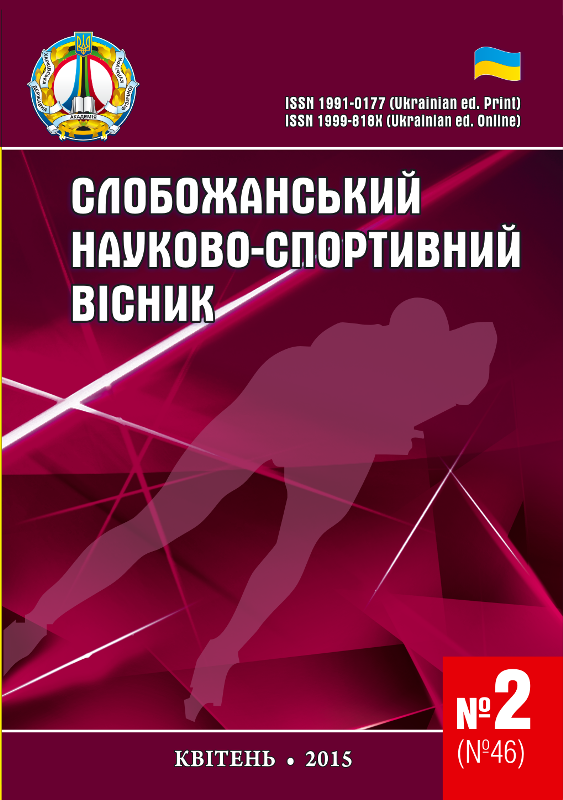Personal development of junior students from deprivation of sensory systems in special boarding school
DOI:
https://doi.org/10.15391/snsv.2015-2.012Keywords:
deprivation, sensory system, personal developmentAbstract
Purpose: to identify ways and content of personal development of younger pupils with sensory deprivation in the process of adaptive physical education (APE) special school. Material and Methods: with the help of the analysis and synthesis of the literature was opened the content of the personal development of younger pupils with sensory deprivation systems. Results: defines the purpose and components of personality formation and primary school children, ways for effective student-centered approach to raising a child with special needs and abilities. Conclusions: outlines ways to implement the goals and objectives of personal-centered approach in the process of adaptive physical education in the primary school children with sensory deprivation in special boarding school.
References
Yevseyev S. P. Teoriya i organizatsiya adaptivnoy fizicheskoy kultury [Theory and organization of adaptive physical education], Moscow, 2002, 448 p. (rus)
Yerakova L. A. Differentsirovannoye fizicheskoye vospitaniye slepykh i slabovidyashchikh shkolnikov v usloviyakh spetsializirovannogo internata : avtoref. kandidata nauk po fizicheskomu vospitaniyu i sportu [Differentiated physical education of blind and visually impaired students in a specialized boarding school :PhD thesis], Kiyev, 2005, 20 p. (rus)
Zhigarev A. M. Vospitatelnaya rabota v shkole-internate dlya slepykh detey [Educational work in a boarding school for blind children], Moscow, 1991, pp. 12–14. (rus)
Kozlenko M. O. Teorіya і metodika korektsіyno-rozvivalnoі roboti v sistemі fіzichnogo vikhovannya uchnіv dopomіzhnikh shkіl : avtoref. d-ra ped. nauk [Theory and methods of correction and developing work in the system of physical education students assisted schools :PhD thesis], Kyiv,1993, 50 p. (ukr)
Kulik T. V. Spetsialnoye obrazovaniye v Rossii XXI veka : traditsii, perspektivy, problemy [Special education in Russia in XXI century: tradition, prospects, problems], 2005, pp. 26–29. (rus)
Litosh N. L. Adaptivnaya fizicheskaya kultura. Psikhologo-pedagogicheskaya kharakteristika detey s narusheniyem v razvitii [Adaptive physical education. Psycho-pedagogical characteristics of children with developmental disorders], Moscow, 2002, 140 p. (rus)
Morgulis I. S. Puti povysheniya effektivnosti ucheb.-vosp. protsessa v shkolakh slepykh i slabovidyashchikh [Ways to improve the efficiency of teaching and educational process in the schools of the blind and visually impaired], Kyiv, 1982, 64 p. (rus)
Solovyev I. M., Shif Zh. I., Rozanova T. V., Yashkovoy N. V. Psikhologiya glukhikh detey [Psychology of deaf children], Moscow, 2006, 448 p. (rus)
Puyk T. Formirovaniye vzaimootnosheniy v kollektive glukhikh shkolnikov [Forming relationships in a team of deaf students], Vilnyus, 1986, pp. 60–62. (rus)
Puyk T. E. Issledovaniye lichnosti detey s narusheniyami slukha [Study of the personality of children with hearing impairment], Moscow, 1981, pp. 38–54. (rus)
Shesterova L. E. Slobozans’kij nauk.-sport. visn. [Slobozhanskyi science and sport bulletin], Kharkіv, 2013, vol. 3, pp. 72–75.
Downloads
Published
How to Cite
Issue
Section
License
Copyright (c) 2015 (Svetlana Demchuk) Демчук Світлана Петрівна

This work is licensed under a Creative Commons Attribution 4.0 International License.
Our publications make use of copyright CREATIVE COMMONS open access journals.
Authors published in this journal agree to the following terms:
1 The authors reserve the right of authorship of the work and pass the journal right of first publication of this work are licensed under the Creative Commons Attribution License, which allows others to freely distribute the published work with reference to the authors of the original work and the first publication of this magazine.
2 The authors have the right to enter into separate agreements for additional non-exclusive distribution of work in the form in which it was published the magazine (such as work place electronic repository institution or publish as part of the monograph), provided that the reference to the first publication of this magazine.

 Attention, authors!
Attention, authors!


